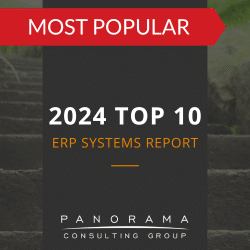Change isn’t only associated with enterprise-wide projects. Change is actually a constant within organizations, so change management should be, as well. What is change management? It is the process of looking at the human side of a project.
While not every day will bring massive process improvement or new ERP software, any time you ask your team members to learn a new tool or adopt new workflows, it’s critical to have steps in place to ease the transition.
Today, we’re sharing a few of the top reasons for change management within an organization.
7 Reasons for Change Management
Organizational change management is about focusing on the people side of change. Whether you’re undergoing a digital transformation or incremental process improvement, change management can help ensure employees fully adopt new ways of working.
Here are some of the most common reasons why organizations employ organizational change management tools and methodologies.
1. To Amplify Benefits Realization
Any time you change or improve a process within your organization, you naturally want the adjustment to deliver the business benefits you expect. Focusing on change management before, during and after the change helps you maximize benefits realization.
The goals and initiatives you’re aiming to achieve will have a hard time getting off the ground without a supportive and fully engaged workforce. Change management empowers your people to support your business goals.
Navigating Change with Rick & Christi
Watch these short and sweet videos to learn about change management from the experts! The series features Rick Platz and Christi Trinder from Panorama’s change management team, who share how they develop and implement successful change strategies for clients.
2. To Solidify Future Changes
While focusing on the changes occurring in the immediate future is most important, don’t forget the potential changes your company may implement further down the road. The more you focus on change management in this immediate project, the easier it will be the next time around.
As you improve the way your company handles and embraces change, you’ll help set it up for even greater transformations in the future.
3. To Align Organizational Practices and Values
Do you operate a people-centric workplace? Is your company built on the principles of valuing and upholding your greatest asset: your employees?
If you’re nodding your head “yes,” then it’s important that your actions align with this aim. In other words, you should make organizational change management a key part of your initiatives. This sends the clear message that your team members matter.
You want to make sure employees are comfortable with what’s coming and equipped to succeed. You also want to address any of their concerns, so their work environment is one in which they feel important and supported.
4. To Remain Competitive
It might be hard to grasp now, but your future success hinges on how well your organization handles even the smallest amount of change. If you’re unable to work past resistance, frustration, dissent and other roadblocks, it could weaken your infrastructure and make it nearly impossible to overcome other challenges.
Learning how to strategically manage change is a core capability that the most competitive and lucrative companies have mastered.
5. To Reduce Change Resistance
Any time you introduce a new way of doing things in your organization, it can cause some degree of change resistance. This is especially the case with a significant, enterprise-wide project, such as an ERP implementation.
Expecting your employees to forego their tried-and-true practices for an all-new approach without the slightest hiccup can be a recipe for disaster. Change management makes sure employees understand not only the reasons behind the shift, but also the individual benefits they can expect. Then, it equips them with the resources and training they need to thrive in their new environment.

6. To Clarify Project Details
Do you know one of the top reasons that projects fail? It isn’t always because of a lack of resources or time. Rather, it’s due to an unclear and inconsistent communication strategy.
Change management communication gives you the opportunity to clarify the key details of your project, so your team members understand them in full. Otherwise, they’ll be left to determine the facts for themselves, which can spread misinformation and stir discord.
If you’re preparing to implement a new ERP system or undergo business process reengineering, a stakeholder-specific communication plan can help lay the groundwork for a transparent and successful effort.
7. To Increase Your ROI
Have you ever stopped to consider how much more successful or profitable your projects could be if you’d managed the people aspects more intentionally?
If you’re failing to recognize a solid ROI on the efforts you’re undertaking, overlooking your people could be the reason why. Even the smallest instances of non-compliance could be holding your company back from achieving the results and returns it needs.
Companies spend a significant amount of time, money and resources on rework and problem-solving associated with not addressing change from the outset. Taking a more proactive approach can help you avoid these setbacks.
Prioritizing Change Management
You don’t have to wait until your company is on the precipice of a major transformation to prioritize organizational change management. Employing change management for more incremental improvements can strengthen your enterprise and prepare it for more complex projects in the future.
There are many reasons for change management, and these are only a few. Our change management consultants can help you determine how to apply change management tools and methodologies to whatever initiatives you’re currently pursuing. Contact us below for a free consultation.














